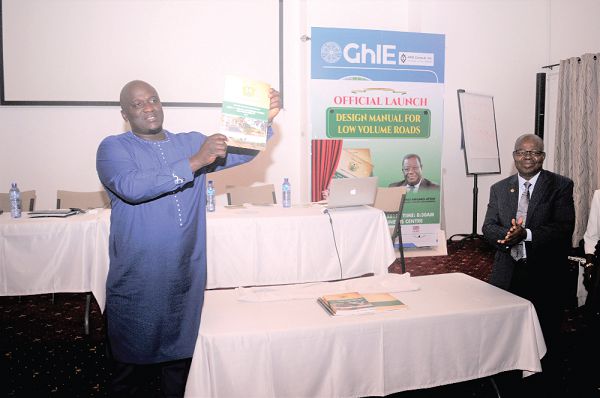
Manual on low volume roads launched
A 500-PAGE manual on the relevance, value for money, safety and sustainability of low volume roads in the country has been launched in Accra.
Low volume roads are roads that carry an average of about 300 vehicles per day (VPD), particularly in rural communities.
Manual
Known as ‘Design Manual for Low Volume Roads,’ the document which is in three parts, contains detailed content and step-by-step guidance on low volume roads.
The manual provides basis for construction, rehabilitation or upgrading of low volume roads in the country in line with international best practices.
The publication was supported by the United Kingdom’s Department for International Development (DFID) through an African Community Access Partnership (AfCAP) research programme.
Significance
In a speech read on his behalf, the Minister of Roads, Mr Kwesi Amoako-Attah, directed that the manual should be used in designing low volume roads in the country.
He said it would provide the relevant information and guidance needed for the provision of appropriate low volume roads to meet Ghana’s growing transport sector.
Mr Amoako-Atta also explained that the manual constituted an essential point of reference for stakeholders in the road sector who desired to ensure value for money in the execution of low volume roads.
The minister said in designing high quality low volume roads, it was vital that “we have commensurate standards, specifications, design guides and manuals,” and therefore, thanked the DFID for supporting the manual preparation process.
“I would also like to thank the Project Management Unit of the Research for Community Access Partnership (ReCAP) and Civil Design Solutions for their roles in managing the project.
Finally, I thank all previous development partners such as DANIDA and JICA, who have contributed immensely towards the development of low volume roads in Ghana,” he added.
According to Mr Amoako-Atta, low volume roads constituted the wealth of the nation, tool for social inclusion, economic development and environmental sustainability, adding “indeed, if quality of our road asset is an indication of development, then their management is a measure of good governance.”
The Technical Director, Manager of ReCAP for West Africa, Dr Paulina Agyekum, said it was important the document was put to good use to justify the money invested in its publication or else “it was better if we had not published it.”
Economic growth
The Ghana Team Leader for the development of the manual, Mr Hamish Golde-Scot, said low volume roads were essential for the economic growth of a country, and was hopeful that the manual would be a useful document.
The immediate past President of the Ghana Institution of Engineering, Mr Steve Anoff Amoaning-Yankson, said the road sector remained the lubricant in the economic growth of a country.
“Having good roads, perhaps starts with good designs, therefore, investing in the time-tested designed manual is necessary for the country’s overall development agenda,” he added